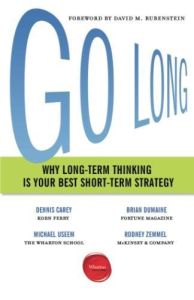Join getAbstract to access the summary!

Join getAbstract to access the summary!
Dennis Carey, Brian Dumaine, Michael Useem and Rodney Zemmel
Go Long
Why Long-Term Thinking Is Your Best Short-Term Strategy
Wharton Digital Press, 2018
What's inside?
CEOs must shift their strategic thinking and investments from the short term to the long term.
Recommendation
An expert panel of authors – top recruiter Dennis Carey, award-winning editor Brian Dumaine, management professor Michael Useem and McKinsey managing partner Rodney Zemmel – assert that too many CEOs prioritize short-term profits over long-term gains. In direct, economical prose, they detail and promote the merits of long-term business thinking, planning and strategizing. The authors explain how to structure and fulfill long-term strategy, and they outline the steps CEOs should prioritize to achieve far-reaching value. getAbstract recommends their commonsense, innovative manual to executives who want to escape the destructive frenzy of short-term thinking so they can lead their organizations to growth and sustained profitability.
Summary
About the Authors
Dennis Carey, a vice chairman of Korn Ferry, founded the CEO Academy. Brian Dumaine founded High Water Press. Michael Useem directs the McNulty Leadership Program at The Wharton School, University of Pennsylvania. Rodney Zemmel is a managing partner at McKinsey & Company.























Comment on this summary
Thank you.